Điểm nhấn
-
 Hội thảo “Thực trạng người Việt Nam hồi hương từ Vương quốc Anh giai đoạn 2014 - 2023”
Hội thảo “Thực trạng người Việt Nam hồi hương từ Vương quốc Anh giai đoạn 2014 - 2023”
-
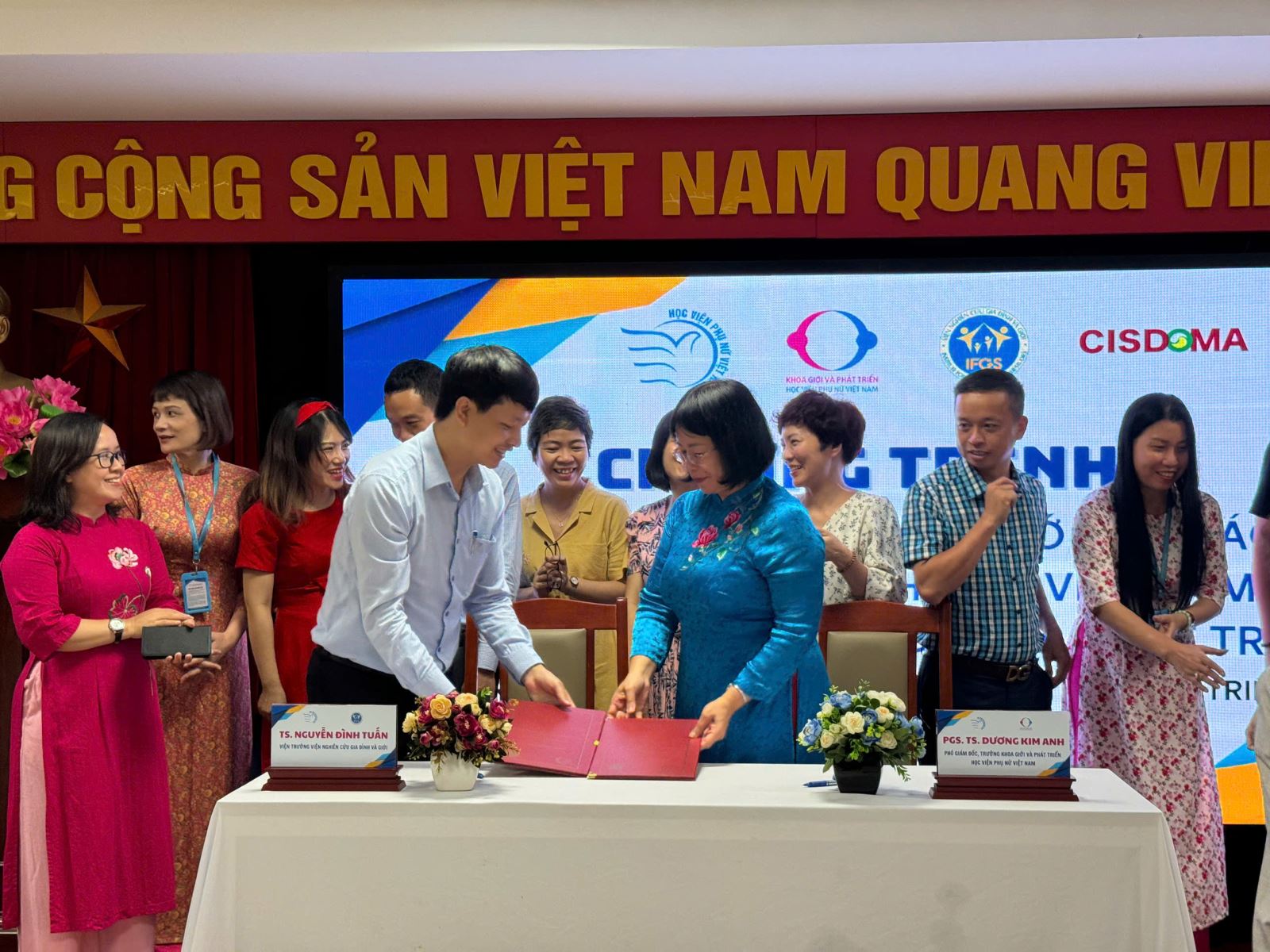 Lễ Ký kết biên bản ghi nhớ hợp tác giữa Học viện Phụ nữ Việt Nam với Viện Nghiên cứu Gia đình và Giới
Lễ Ký kết biên bản ghi nhớ hợp tác giữa Học viện Phụ nữ Việt Nam với Viện Nghiên cứu Gia đình và Giới
-
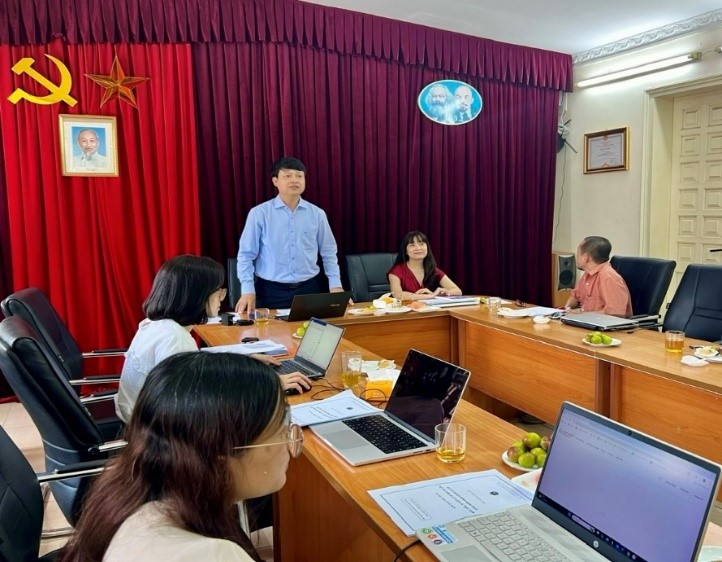 Hội thảo khoa học: "Bộ chỉ số gia đình hạnh phúc: Một số vấn đề lý luận và thực tiễn"
Hội thảo khoa học: "Bộ chỉ số gia đình hạnh phúc: Một số vấn đề lý luận và thực tiễn"
-
 Tọa đàm khoa học "Vận dụng lý thuyết trong nghiên cứu khoa học xã hội"
Tọa đàm khoa học "Vận dụng lý thuyết trong nghiên cứu khoa học xã hội"
-
 Hội nghị Đối thoại giữa Chi ủy, Lãnh đạo viện với đảng viên, viên chức và người lao động Viện nghiên cứu Gia đình và Giới 6 tháng đầu năm 2024
Hội nghị Đối thoại giữa Chi ủy, Lãnh đạo viện với đảng viên, viên chức và người lao động Viện nghiên cứu Gia đình và Giới 6 tháng đầu năm 2024
-
 Chi bộ Viện nghiên cứu Gia đình và Giới tổ chức sinh hoạt chuyên đề: Đoàn kết thống nhất trong Đảng theo tư tưởng Hồ Chí Minh
Chi bộ Viện nghiên cứu Gia đình và Giới tổ chức sinh hoạt chuyên đề: Đoàn kết thống nhất trong Đảng theo tư tưởng Hồ Chí Minh
-
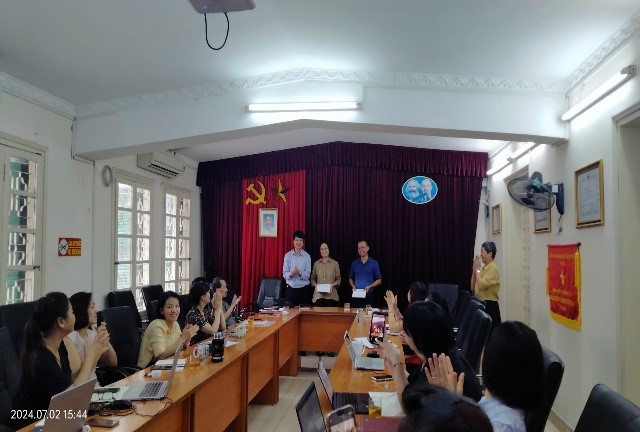 Cuộc thi “Nét đẹp và giá trị gia đình Việt Nam” hưởng ứng Ngày Gia đình Việt Nam 2024
Cuộc thi “Nét đẹp và giá trị gia đình Việt Nam” hưởng ứng Ngày Gia đình Việt Nam 2024
-
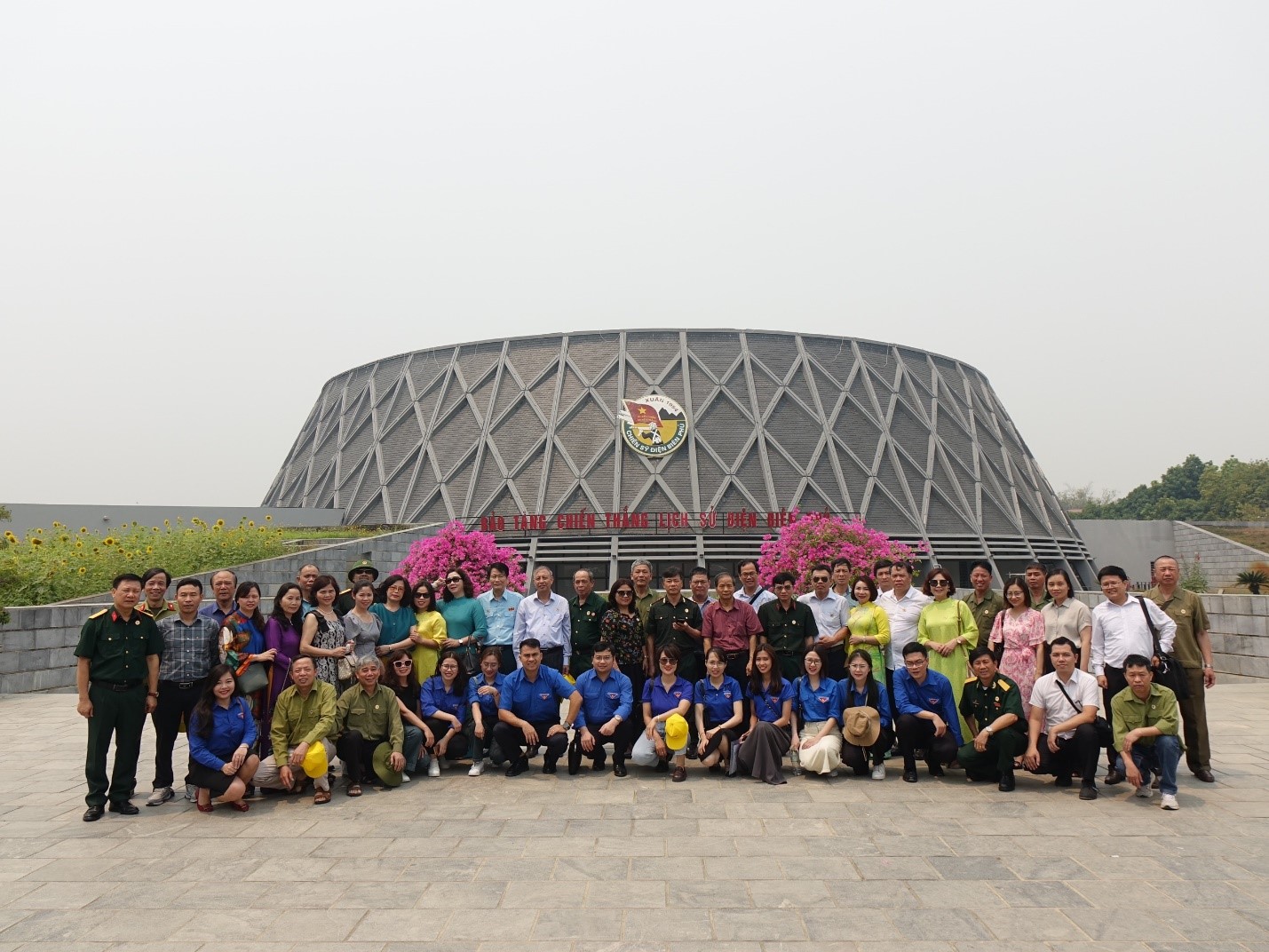 Hội Cựu chiến binh, Đoàn Thanh niên Viện Hàn lâm Khoa học xã hội Việt Nam đi thăm lại chiến trường xưa Điện Biên Phủ
Hội Cựu chiến binh, Đoàn Thanh niên Viện Hàn lâm Khoa học xã hội Việt Nam đi thăm lại chiến trường xưa Điện Biên Phủ
- Tổng mục lục Tạp chí 2023
-
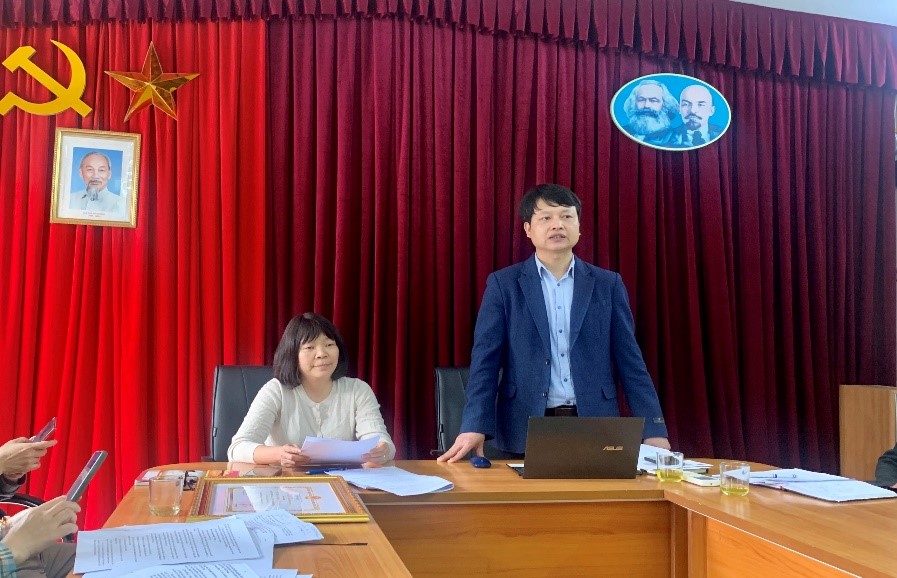 Viện nghiên cứu Gia đình và Giới phát động phong trào thi đua và ký Giao ước thi đua năm 2024
Viện nghiên cứu Gia đình và Giới phát động phong trào thi đua và ký Giao ước thi đua năm 2024
Liên kết web
Số lượt truy cập
23
5407463
Chi tiết tạp chíNo. 2 - 2015
On 29th September 2015 in Hanoi, Vietnam Academy of Social Sciences (VASS) in collaboration with UNESCO Office in Vietnam and UNESCO Hanoi Office held international forum on “Gender dimensions of social exclusion: Towards more inclusive policies for women.” Institute for Family and Gender Studies (IFGS) and Department of International Cooperation (IDC) were assigned by VASS as the forum organizing committee.
The forum was attended by about 120 local and international participants who discussed and exchanged academic information and research results on several dimensions of social exclusion as well as policy recommendations for promoting gender equality and social inclusion for Vietnamese women. The participants were i) researchers from UK, France, South Korea, Nepal, Singapore; ii) research institutions and universities on social sciences in Hanoi; iii) policymaking bodies on gender equality, family, ethnic minority people in Vietnam such as Department of Gender Equality (Ministry of Labour, Invalids and Social Affairs), Department of Family Affairs (Ministry of Culture, Sports, and Tourism), Committee of Ethnic Minority Affairs; iv) mass organisations and non-government organisations such as Vietnam Women’s Union, CSAGA, CEPEW; v) international organisations in Vietnam such as UNDP, UN Women, UNFPA, AusAID, Asia Foundation, SSRC.
After opening remarks by Vice President of Vietnam Academy of Social Sciences cum Vice President of Vietnam National Commission for UNESCO Professor Vo Khanh Vinh, General Secretary of Vietnam National Commission for UNESCO Pham Sanh Chau, and Representative of UNESCO Hanoi Office Katherine Muller-Marin, Director of IFGS Associate Professor Nguyen Huu Minh presented the introductory report on gender dimensions of social exclusion, Vietnam policies on social inclusion and delineated the themes for forum discussion. The speeches and introductory report highlighted the significance of international forum and the importance of promoting gender equality to reduce social exclusion and inclusive policies for women and socially excluded groups.
The forum focused on three main themes: i) Theoretical issues of social exclusion from gender perspectives in the linkage with the practice in Vietnam; ii) Women’s access to social resources; iii) Healthcare and security of socially excluded groups.
1. Gender dimensions of social exclusion. This session provided theoretical and practical overview of social exclusion which was to guide the discussion for the two next sessions of the forum. There were four presentations in this session, including those from Department of Gender Equality (Ministry of Labour, Invalids and Social Affairs) which is responsible for state management of gender equality; two presentations of Vietnam and UK researchers on social exclusion of two typical groups in Vietnam – ethnic minority people in the Central Highlands and Northern mountainous provinces; a presentation by UN Women on tendency, challenges and recommendation for inclusive growth of women. The session focused on the conceptual issues of social exclusion and its distinction with other concepts of inequality and difference. Several issues of social exclusion of ethnic minority people, migrants, the elderly, and cultural issues such as early marriage, social norms, and unpaid care work were discussed.
2. Women’s access to social resources. Two international researchers and three local researchers presented in this session on the obstacles women have been facing in their participation in management and leadership, access to developmental resources, vocational training for socially excluded groups of ethnic minority women, divorced women and the comparison with the case of Nepal. The presentations in this session underlined the reality and the influencing factors of gendered exclusion in which cultural factors play key role. The session invited several rooms for discussion such as while Nepal and Vietnam has several similarities in terms of cultural obstacles for women’s political participation, the proportion of Nepal women’s political participation is higher than that of Vietnam despite the fact that Vietnam has a comprehensive legal system; whether gender-based exclusion is geographically different? What are the factors promoting gendered inclusion?
3. Healthcare and security. In this session, there were three presentations from Vietnamese presenters on the situation and solutions to deal with domestic violence in Vietnam; characteristics and social exclusion of disable women and disable men; the obstacles of ethnic minority women in the Northern mountainous provinces in accessing to healthcare service. Also in this session, a Korean researcher presented the case of full-time mothers in South Korea who are excluded from benefiting a healthcare policy and a Singaporean researcher presented on the role of education to adolescents and the burden of childbearing which creates social exclusion of adolescents. Again, the discussion in this session emphasized the role of culture, customs, education and awareness raising in reducing social exclusion of women.
After thematic sessions, the participants attended a plenary session looking back discussion of the thematic sessions and emerging issues which were very relevant and comprehensive information for researchers and lecturers on social exclusion and its gender dimensions from a comparative perspective between Vietnam and international landscapes.
In his closing remarks, Vice President of Vietnam Academy of Social Sciences, Vice President of Vietnam National Commission for UNESCO - Professor Vo Khanh Vinh highlighted that the forum was the acknowledgment of local and international researchers and policymakers that promoting gender equality would reduce social exclusion. He also emphasized that the forum has provided implications and recommendations for gender-responsive policy making on social exclusion in Vietnam. The discussion of the forum would be a useful reference source on gender dimensions of social exclusion for researchers, lecturers and policymakers.
The forum has attained its objective of "helping researchers and policymakers intensify their linkage for the goal of inclusive growth, developing policies and programmes for the sake of women, especially vulnerable women in their access to social resources, healthcare and security in an effort to reduce poverty and narrow gender inequality that creates better balance and inclusive social policies for women" as spoken by General Secretary of Vietnam National Commission for UNESCO Pham Sanh Chau in his forum opening speech.
Given abovementioned results, the forum is expected to publish its proceedings to widely disseminate the forum results and knowledge amongst researchers, policy makers and practitioners on gender equality and for the advancement of Vietnamese women.
Within the framework of the State-level project “cross-border marriage management in relation to social development in the mountainous provinces of our country today” (KX02.21/11-15) under the program “Research in social development and social development management in Vietnam to 2020”, on November 5th, 2015, in Hanoi, the workshop on “Cross-border marriage management in relation to social stability and development” was organized by the Institute for family and Gender Studies.
The purpose of the workshop is to share some key findings of the research and scientific exchange on issues related to cross-border marriages, and social management in border areas.
Participants are representatives from 15 agencies and organizations, including the State-level Major Science and Technology Program Office KX.02/11-15, State management agencies (Department of Legal Dissemination and Education, Department of Civil Status, Citizenship, Authentication - the Ministry of Justice; Department of Propaganda and Training - the Border Guard Command, etc), scientific research institutions, universities (Institute of Ethnography, Institute of Chinese Studies, University of Culture Studies, etc), and all researchers of the Institute for Family and Gender Studies.
There are six presentations. Presentation 1: Theoretical approach toward cross-border marriage studies; Presentation 2: Policy on foreign bride management in some countries and regions in East Asia; Presentation 3: Ethnic policies of Vietnam in the current period; Presentation 4: Characteristics of cross-border marriage of ethnic groups in the mountainous areas of Vietnam; Presentation 5: Some issues about marriage and social management of the border areas through the surveyed results; Presentation 6: Solutions to effectively promote the distribution of laws on marriage and family for ethnics in border regions.
In general, the reports at the seminar briefly and concisely provide an overall picture of the situation of cross-border marriage and related social issues in the mountainous provinces of Vietnam. In the discussion, some experts say that cross-border marriage is a complex problem which may occur because of both active and passive reasons (for example, because of customs, of state policies, etc), thus, the proposed solutions are to thoroughly understand the guidelines and policies of the state, to conduct education and communication for officials and people of the State policies, to establish policies which are suitable to people, and especially to protect against all complex problems of cross-border marriages. There is a need to have additional researches about other countries’ cross-border marriage policies related to Vietnam, etc.
In closing workshop, Assoc.Prof. Nguyen Huu Minh, Director of the Institute for Family and Gender Studies, on behalf of the Organizing Committee, confirms that there should be some further researches on this topic, and the management as well as policies for cross-border marriage should be studied more to fully explain the positive and negative consequences of this phenomena.
In order to strengthen the relationship between the Institute for Family and Gender Studies and the Korean Women Development Institute, a knowledge and experience exchange seminar was held by the former in November 16th 2015 in Hanoi. The seminar was attended by many researchers from the two institutes. In addition, staffs from Vietnam Women’s Union and Vietnam Women’s Academy were among the participants. Due to time limit, there were only 02 presentations given by the Institute for Family and Gender Studies and the Korean Women Development Institute in the seminar.
The representative of the Korean Women Development Institute performed the presentation entitled “Institutionalizing policies related to gender mainstreaming”. Gender mainstreaming is regulated in the Korean legislation and is implemented in four major fields including (1) education on gender equality, (2) gender statistics, (3) gender analysis and (4) policy making. Thus, gender impact assessment plays an important role in developing policies which ensure gender equality and bring about benefits to all stakeholders. The process of integrated gender into policies and programs was illustrated by vivid examples.
On behalf of the Institute for Family and Gender Studies, Dr. Tran Thi Minh Thi – Vice Director gave a presentation on “Some major dimensions of policies for women in Vietnam”. The presentation focused on three groups including policies on gender equality; marriage and family; and care activities.
To closing the seminar, the representative of Korean Women Development Institute expressed the wish to continue strengthening the relationship between the institute for Family and Gender Studies and the Korean Women Development Institute as the content of the memorandum of agreement signed by the two partners. Assoc. Prof. Dr. Nguyen Huu Minh – Director of Institute for Family and Gender Studies affirmed the close association as well as the commitment to enhance research exchange and collaboration activities between the two two institutes in the future.
Beliefs about Cervical Cancer among Vietnamese Female Sex Workers, in Ho Chi Minh City
The article explores how Vietnamese female sex workers (FSWs) explained about cervical cancer basing on a qualitative study. As the research found, most FSWs considered cervical cancer associated with white blood, poor hygiene and multiple sexual partners. Other FSWs believed that cervical cancer is God’s will. From these beliefs, they postpone going for cervical cancer screening. For them, the best way to prevent cervical cancer is treating white blood, practicing good hygiene, having safe sex with condoms and limiting sex work. To include, the author suggests that FSWs should be provided with more information about the issues through education courses which are done by health professionals and peer-educators.
Masculinity and its Impact on Female Leadership in Media Companies in Vietnam
Based on a three-year research experience, online reports with individual female journalists as well as female leadership, and a personal observation as a female journalist with work experience of fourteen years, the author argues that masculinity has had a significant influence on the small number of female leaders working for media companies in Vietnam. These impacts include that the majority of male and female journalists do not want to work with female leaders, and that female leaders follow traditionally male rules when managing their staffs. Increasing these aforementioned impacts is that men do not want to share their privileges and women do feel powerless to challenge this status quo.
Based on a desk review, the article analyses the reported reasons for sexual abuse of children, including structural factors, such as gender, cultural and demographics, life course, socio-economic status, and the effects of social backgrounds such as modernization and child protection system, legal frameworks and policy responses—interact to affect sexual abuse in children’s homes and communities. It places age and gender at its centre, focusing on girls and boys at different stages of the life course, from the very young to older adolescents. The paper is premised on the understanding that violence-related vulnerability evolves in complex socio-economic and cultural contexts using a ‘socio-ecological framework’ to understand the interplay of personal, situational, and structural factors that combine to cause abuse.
Gender responsive personnel management is crucial to the equal participation of men and women in leadership and management in public sector. Public sector personnel management includes many different components. This article, however, focuses on the review and analysis of regulations as well as policies related to the planning for potential leaders and nomination of public sector officials as these are two key parts necessary to the process of strengthening the representation of women in leadership and management. The article is part of the research results under the project “Research on public sector personnel policy in order to enhance women’s representation in leadership and management within public sector” implemented by the Center for Women in Politics and Public Administration.

